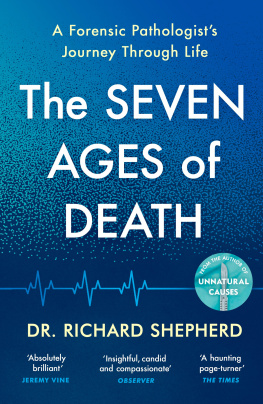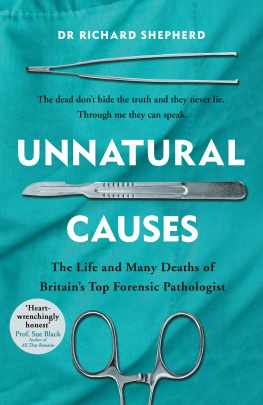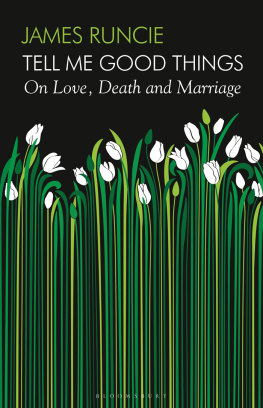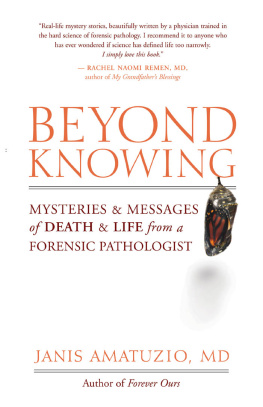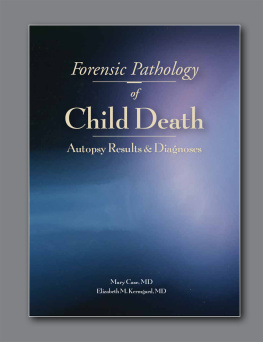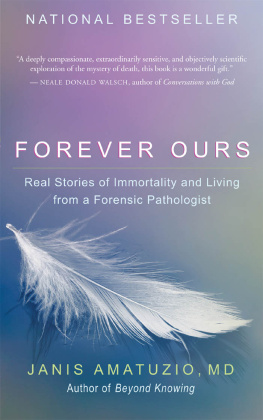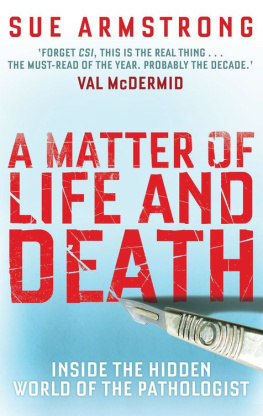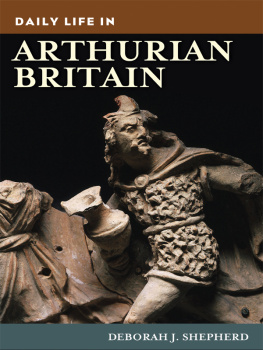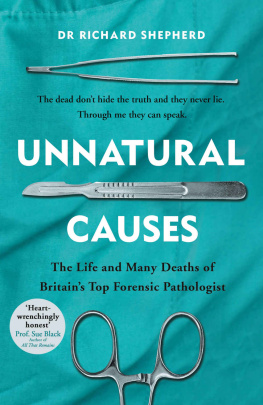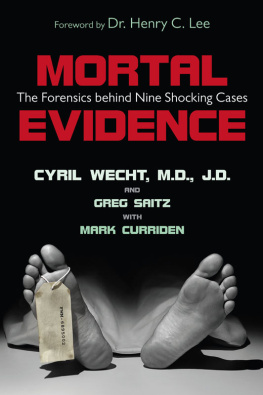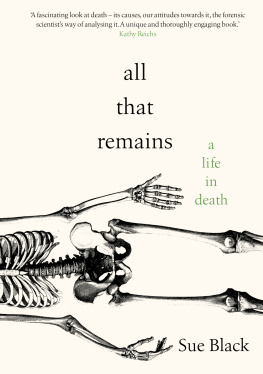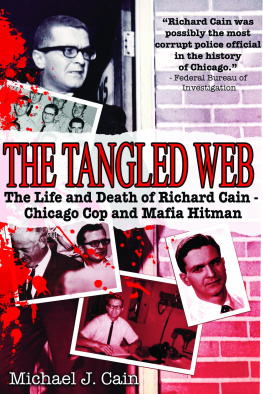By the same author
Unnatural Causes
Dr Richard Shepherd
THE SEVEN AGES OF DEATH
A Forensic Pathologists Journey Through Life

PENGUIN BOOKS
UK | USA | Canada | Ireland | Australia
New Zealand | India | South Africa
Penguin Books is part of the Penguin Random House group of companies whose addresses can be found at global.penguinrandomhouse.com.

First published by Michael Joseph 2021
Published in Penguin Books 2022
Copyright Dr Richard Shepherd 2021
The moral right of the author has been asserted
Cover design by Holly Ovenden
This book is substantially a work of non-fiction based on the life, experiences and recollections of the author. To maintain patient confidentiality and to protect the privacy of individuals, names of people, places and dates have been changed and certain situations and individuals may have been merged to further protect identities. Any similarities are purely coincidental.
ISBN: 978-1-405-94711-4
This ebook is copyright material and must not be copied, reproduced, transferred, distributed, leased, licensed or publicly performed or used in any way except as specifically permitted in writing by the publishers, as allowed under the terms and conditions under which it was purchased or as strictly permitted by applicable copyright law. Any unauthorized distribution or use of this text may be a direct infringement of the authors and publishers rights and those responsible may be liable in law accordingly.
To my wonderful family for all the happiness that you have given me, and especially to my wife, Linda, who undoubtedly is my saviour in so many ways.
Authors Note
In my first book, Unnatural Causes, I explained how difficult it had been for me to change names and identifying details of the cases I discussed. Throughout my working life I have strived for accuracy but at the same time, I have tried to alleviate the suffering of the bereaved. It was a hard decision, but I finally made those changes because I would not want any reader to recognize a relative in print and perhaps unexpectedly revisit their darkest days. The same is true of this book. The names of those whose stories are too well known to disguise are given. In all other cases I have changed personal details to preserve confidentiality while maintaining relevant facts. It must also be acknowledged that this is a book about death. It contains sensitive but unflinching descriptions of those who have died from both natural and unnatural causes, from infants to the very old. I sincerely hope that you do not find this upsetting.
All the worlds a stage,
And all the men and women merely players:
They have their exits and their entrances;
And one man in his time plays many parts,
His acts being seven ages. At first the infant,
Mewling and puking in the nurses arms;
And then the whining school-boy, with his satchel
And shining morning face, creeping like snail
Unwillingly to school: And then the lover;
Sighing like furnace, with a woeful ballad
Made to his mistress eyebrow: Then a soldier,
Full of strange oaths, and bearded like the pard,
Jealous in honour, sudden and quick in quarrel,
Seeking the bubble reputation
Even in the cannons mouth. And then the justice;
In fair round belly with good capon lind,
With eyes severe and beard of formal cut,
Full of wise saws and modern instances;
And so he plays his part: The sixth age shifts
Into the lean and slipperd pantaloon;
With spectacles on nose and pouch on side;
His youthful hose, well savd, a world too wide
For his shrunk shank; and his big manly voice,
Turning again toward childish treble, pipes
And whistles in his sound: Last scene of all,
That ends this strange eventful history,
Is second childishness and mere oblivion;
Sans teeth, sans eyes, sans taste, sans everything.
As You Like It, Act 2, Scene 7, William Shakespeare

Prologue
As my father lay dying, I took his hand gently and squeezed it. How thin his busy fingers had become, and how still now. And how strange it felt to touch him in this way. He had been both parents to me since my mothers death when I was nine and, although I loved him deeply and somehow used to curl on his lap as a leggy child, I would not say that we were a physically demonstrative family. Now, I was reminded of my childhood, feeling his soft, warm hand in mine.
There was a significant divide between our post-war generation and our fathers. Brought up by people who were young in Victorias reign, impacted by the catastrophe that was the First World War, youthful in the midst of a global depression, active in the Second World War; well, of course they were different from boomers like us, the generation that has had it all.
I watched his body. He was propped up on the pillows. His eyes were closed. His chest rose and fell. Slowly, rhythmically. I knew that soon the rhythm would stop. I thought of the way he had conducted himself throughout his life, how all his behaviour had shown his humanity and respect for others. His quiet life, his small triumphs. His hobbies. The way he recorded music from the radio and then filed the cassettes endearingly in his orderly, accountants fashion. The undemonstrative but undoubted love of his Sunday phone calls and weekly family newsletters once we had left home. The unbearable absence we were approaching.
I said goodbye. I told him what a wonderful father he had been and how proud my long-dead mother would have been of him for the great care he had shown us. But I did not say I loved him. He knew that, and his generation was more comfortable knowing it than hearing it. I drove away from the hospice sure that I would not see him again. It was a bright September day. I noticed Devons autumnal beauty even through my tears. I let them fall. That is what we do when death takes one we love. We cry and cry. What else can we do?
I was back in London, deep in court cases and post-mortems, when my brother arrived in Devon to take up the bedside vigil. Later that week, when the phone rang, somehow I knew who it would be and what news that voice would bring.
It was a peaceful death. The simple closing of a life. Of course, it was well managed by the hospice staff. There was no pain and my brother was at his side. My father had seen all of us in the last few days and our presence had reassured him of our love and of our stable lives, which he had done so much to establish. He could take the final step of lifes journey without anxiety about whatever would happen in the world when he left it. He was an atheist, but he always believed, hoped, that he would join my mother one day. And he accepted that this was his time to die. He slipped peacefully away.
After the call, I sat at my desk. A new numbness; mental, physical.
A file lay open in front of me. It was a murder file. Its pictures, now scattered across my desk, showed me a very different end of life. It is my profession to examine the deceased and, for the vast majority of those I encounter, death has come too soon and seldom calmly. How easy it is for me to forget that my fathers sweet departure is the norm.

